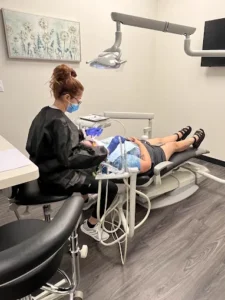Flossing is a crucial part of maintaining oral hygiene, but if your gums hurt after flossing, you may be wondering why. Gum pain, bleeding, or sensitivity can result from various factors, ranging from improper flossing techniques to underlying dental health conditions.
In this guide, we’ll explore common causes of gum pain after flossing, effective remedies, prevention tips, and when to see a dentist for professional care.
Why Do My Gums Hurt After Flossing? Common Causes
If flossing leaves your gums sore, swollen, or bleeding, it’s important to identify the root cause. Here are some of the most common reasons:
1. Improper Flossing Technique
If you’re flossing too aggressively or using the wrong method, you may be damaging your gum tissue instead of improving your gum health.
- Signs: Bleeding gums, tenderness, irritation
- Solution: Use a gentle flossing technique and avoid snapping the floss into your gums.
2. Inflammation or Gum Disease (Gingivitis & Periodontitis)
Gingivitis (early-stage gum disease) or periodontitis (advanced gum infection) can make your gums sensitive to flossing. If you have plaque and tartar buildup, your gums may be inflamed and prone to bleeding when flossed.
- Signs: Red, swollen, or bleeding gums, tenderness, bad breath
- Solution: Maintain a consistent oral care routine with flossing, brushing, and antiseptic mouthwash. Schedule a dental check-up if symptoms persist.
3. Flossing Too Hard or Over-Flossing
Flossing too frequently or using excessive pressure can cause gum recession, exposing the roots of your teeth and leading to tooth sensitivity and pain.
- Signs: Soreness, exposed roots, gum irritation
- Solution: Floss once a day using a gentle, controlled motion.
4. Using the Wrong Type of Floss
Different types of floss—waxed, unwaxed, tape floss, or floss threaders—affect how your gums react to flossing. If you have sensitive teeth or receding gums, using a rough or thick floss may cause irritation.
- Signs: Discomfort, gum soreness, floss getting stuck between teeth
- Solution: Choose a gentle floss or water flosser for a less abrasive cleaning method.
5. Pre-Existing Dental Issues (Cavities, Tooth Decay, Exposed Nerves)
Flossing may irritate an existing dental problem, such as cavities, exposed roots, or a cracked tooth. If pain persists in one area after flossing, tooth decay could be the cause.
- Signs: Localized pain, throbbing discomfort, increased tooth sensitivity
- Solution: Schedule a dental consultation for a thorough examination.
How to Prevent Gum Pain After Flossing
If flossing causes gum irritation, follow these preventive steps to protect your gums:
1. Use a Gentle Flossing Technique
- Step 1: Use 18 inches of dental floss and wrap it around your fingers.
- Step 2: Slide the floss between your teeth using a gentle back-and-forth motion.
- Step 3: Curve the floss into a C-shape and move it below the gumline without snapping.
2. Choose the Right Floss
- Soft, waxed floss: Ideal for sensitive gums.
- Water flossers: A gentle alternative for people with gum sensitivity.
- Floss picks or tape floss: Good for people with tight teeth gaps.
3. Maintain a Proper Oral Care Routine
- Brush twice daily with fluoride toothpaste.
- Use an antibacterial mouthwash to reduce bacteria buildup.
- Hydrate to keep gums moist and healthy.
4. Address Underlying Gum Conditions
- If you have gum disease, follow a dentist-approved treatment plan.
- For sensitive teeth, use desensitizing toothpaste to reduce discomfort.
Common Questions About Gum Pain After Flossing
1. Is it normal for gums to hurt after flossing?
Mild discomfort is normal for new flossers, but persistent pain may indicate gum inflammation or improper flossing techniques.
2. Should I stop flossing if my gums bleed?
No! Bleeding gums are often a sign of gingivitis. Continue flossing gently, and symptoms should improve as your gum health strengthens.
3. How long does it take for gums to stop hurting after flossing?
If pain persists beyond one week, consult a dentist for a dental check-up.
4. Can flossing damage gums permanently?
Aggressive flossing can contribute to gum recession, so it’s essential to floss gently and use the correct technique.
When to See a Dentist
If gum pain continues despite improving your flossing technique, seek professional help. A dentist or periodontist can assess your oral health and recommend treatments such as:
- Deep cleaning (scaling and root planing)
- Periodontal therapy for advanced gum disease
- Fluoride treatment for sensitive teeth
Schedule an Appointment at Celebrate Dental Austin
Are your gums sore after flossing? It may be time for a dental check-up. At Celebrate Dental Austin, our team of experts can evaluate your gum health, recommend the best flossing techniques, and provide professional cleanings to prevent gum disease.
Book Your Appointment Today!
- Get personalized tips to floss without pain.
- Improve your oral health with professional care.
Your gum health is essential—schedule a visit today for a healthier, pain-free smile!









